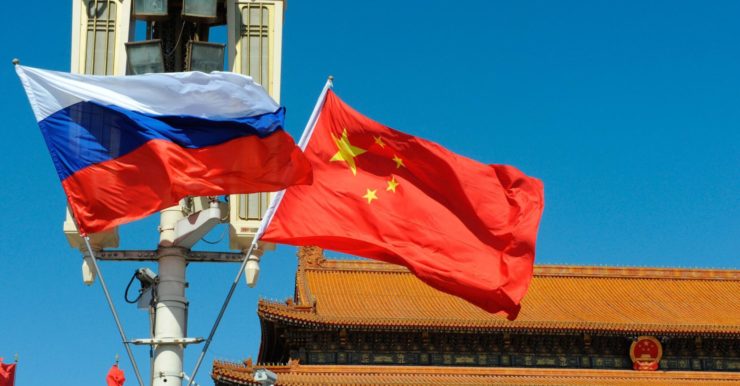
In March 2023, when China’s President Xi visited Moscow, he told his Russian counterpart that the scope of the changes taking place in today’s world is such that has not been “seen for 100 years.” The pace and the scope of these changes – which we can understand in terms of a visible shift towards a multipolar world – warrants a very calculated response. For Russia and China, otherwise seen as two so-called “revisionist” powers in Washington – the best response is to solidify their alliance against the combined assault of the forces i.e., the US-led West, resisting this change. This response was/is at the heart of what we today know as the “no limits” friendship between both states. And, it is this friendship that saw its recent expansion through multiple economic pacts on trade cooperation. After signing these pacts in Beijing, Russian Prime Minister Mikhail Mishustin said that these pacts “are characterised by mutual respect of each other’s interests, the desire to jointly respond to challenges, which is associated with increased turbulence in the international arena and the pattern of sensational pressure from the collective West.” Chinese Premier Li Qiang hailed the “new era” of Sino-Russia ties.
There is no denying that these pacts hold considerable importance as an open defiance of Western sanctions. But their timing also holds crucial importance, as these pacts came immediately after the G-7 summit held in Japan where the combined Western powers targeted China and Russia for various reasons, including the military conflict in Ukraine. While the G7 pledged more support for Ukraine – even as Biden announced sending F-16s – it also criticised China for its claims on the South China Sea and vowed to resist Beijing’s so-called “economic coercion” and “human rights abuses in Xinjiang, Tibet and Hing Kong.”
For both China and Russia, the West’s desperation is quite visible here. Not only because the West keeps failing in reversing China’s economic rise and establishing a global coalition against Beijing, but also because the combined NATO has thus far completely failed to defeat Russia in Ukraine. In fact, Russia’s announcement of a victory in Bakhmut earlier this month has further squeezed the geopolitical space for the US and its NATO allies.
The Russian victory in Bakhmut is not just territorial; it also symbolises the internal weakness of the old West-led system. For Russia and China, signing new pacts at this stage not only means a step towards pushing that system down but also celebrating it as a step towards a multipolar world in which the old forces cannot unilaterally dictate global politics.
Do these moves depict a Russia crumbling under the weight of Western sanctions? Most Western mainstream media show Russia facing “economic problems” due to sanctions. But this is hardly factual. Ever since the US forced Europe to stop buying Russian oil, Moscow has found many buyers elsewhere, especially in Asia. Russian oil now accounts for 20 per cent of India’s annual crude imports while it has already replaced Saudi Arabia as the largest supplier of oil to China. Due to these factors, Russia’s overall exports have increased as compared with a year ago.
While this may sound like Moscow selling its oil to new buyers, this sale also signals the gradual – but certain – consolidation of a system operating rather independently of the West. In this context, new pacts between Russia and China – while bilateral – have deeper ramifications insofar as they tend to render the US-led system more and more irrelevant while presenting to other countries alternative options at the same time.
This pattern explains why Russia keeps finding more and more buyers. Pakistan is one of the recent entrants, as its eagerness to avoid a sovereign default can find potential success via cheap Russian oil. Russian oil will not only help Pakistan reduce its overall import bill – and thus save crucial foreign exchange – but also cement its alliance with the East. This turn towards Russia is also part of a foreign policy shift within Pakistan away from the US. A recently leaked memo written by Pakistan’s current Foreign Minister for State argued for consolidating Pakistan’s alliance with China rather than the US. It asked the government of Pakistan to stop ‘appeasing’ the US.
In this context, every new move that Russia and China make – including new trade pacts – sends a wave across the world, as it becomes a step towards a multipolar world. Countries like Pakistan cannot help but notice the real potential of such pacts. In fact, as irony would have it, these countries have their perceptions and worldviews shaped directly by the US.
The US National Security Council spokesperson John Kirby recently said in a TV interview that China and Russia are targeting “this international rules-based order that the United States and so many of our allies and partners have built up, since the end of World War II”, adding that both China and Russia have increased their mutual cooperation for this specific purpose.
If China and Russia are actually pushing to change this order – and they certainly are – and if the Russia-Ukraine conflict, which is basically a conflict between Russia (and its allies) and the US and its allies, can be taken as a symbol of this very effort to change the system, Russia’s recent victories signify how this change is not too far from actualisation.
In fact, with every day passing it seems more and more indispensable, which is why more and more countries are coming around to the idea of its inevitability and the necessity of adjusting their foreign policies, accordingly, seeing the increasing Sino-Russian cooperation as the building block of the new world order and their bilateral pacts as gateways for future multilateral arrangements.
Salman Rafi Sheikh, research-analyst of International Relations and Pakistan’s foreign and domestic affairs, exclusively for the online magazine “New Eastern Outlook.“